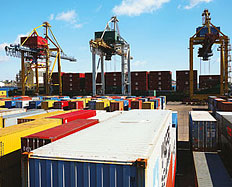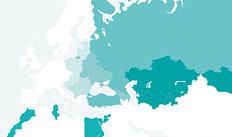Chapter 2
Inflation
Inflation has not been a pressing concern in the majority of transition countries, as slowing growth and easing world food prices led to a deceleration in price increases in much of the region between the third quarter of 2011 and mid-2012 (in line with a global trend towards disinflation) (see Chart 2.5). Indeed, inflation fell more quickly in the transition region than in other emerging markets. However, following a drought and poor corn harvest in the United States, food prices have again begun to accelerate in mid-2012, posing renewed risks to price stability in the region.
Source: IMF IFS and CEIC Data.
Note: The chart shows unweighted averages of year-on-year CPI inflation for each region. * The EBRD regional average does not include Belarus, where year-on-year inflation exceeded 100 per cent in Q4 2011.
The drop in inflation was especially evident in some EEC and Central Asian countries, where food constitutes a larger share of the consumer price index (CPI) basket (see Chart 2.6). In Ukraine a good harvest led to a drop in food prices in the second quarter of 2012 and a currency appreciation against the euro reduced the cost of imports. There was also a large temporary fall in Serbia where the easing pressure from regulated prices, tightening of monetary policy and low demand allowed inflation to fall below 3 per cent for the first time in April 2012, but prices began to accelerate again in subsequent months.
Source: National authorities via CEIC Data.
Note: This chart shows year-on-year CPI inflation in August 2012 and August 2011.
Core inflation has remained fairly stable in the majority of transition countries. Some rapidly growing economies, such as Turkey, continue to register elevated rates, but across the region there was no clear relationship between growth and core inflation in 2011.
Inflation remains a concern in a few cases. Hungary, where both food and energy prices increased at the start of 2012, is the only CEB country where headline inflation has breached 5 per cent. In Turkey, inflation remains high due to elevated core inflation. Belarus remains the country with the highest inflation in the transition region, even though it appears to be returning to price stability as month-on-month seasonally adjusted inflation has remained below 3 per cent in 2012 after a period of very high inflation following the devaluation of its currency in May 2011. Loose fiscal policy and large capital inflows in Mongolia have fuelled a rapid expansion of consumer spending, causing a sharp acceleration of inflation.
Renewed pressure in world food markets that started in early summer 2012 could once again raise prices and therefore overall inflation rates in many transition countries. Although the impact of world food prices on local prices varies significantly across countries, the correlation between the former and the food component of domestic consumer price indices (CPI) has risen substantially in recent years in most countries of the region. Further food-related upward pressure on the CPI is therefore to be expected in the coming months and is already detectable in Albania, Bulgaria, Croatia, Estonia, FYR Macedonia, Montenegro, Morocco and the Slovak Republic. The speed and magnitude of the impact of world food prices on domestic inflation will likely be higher for those countries where food represents a larger proportion of their import and consumer spending. These include Albania, the three Caucasus countries and Egypt in particular, although policy interventions (such as subsidies in the case of Egypt) could lessen the direct effect on domestic prices.
Global food prices have become much more volatile, partly due to a higher frequency of climate change-induced extreme weather events. Coupled with the rise in the correlation between world and domestic food prices, this implies a greater fluctuation in domestic inflation, which can indeed be observed in almost all transition countries with the exception of Poland, Romania, Tunisia and Turkey. Even without a further large world food price spike, volatile food inflation and its impact on overall inflation has posed a challenge for central banks in the region.







